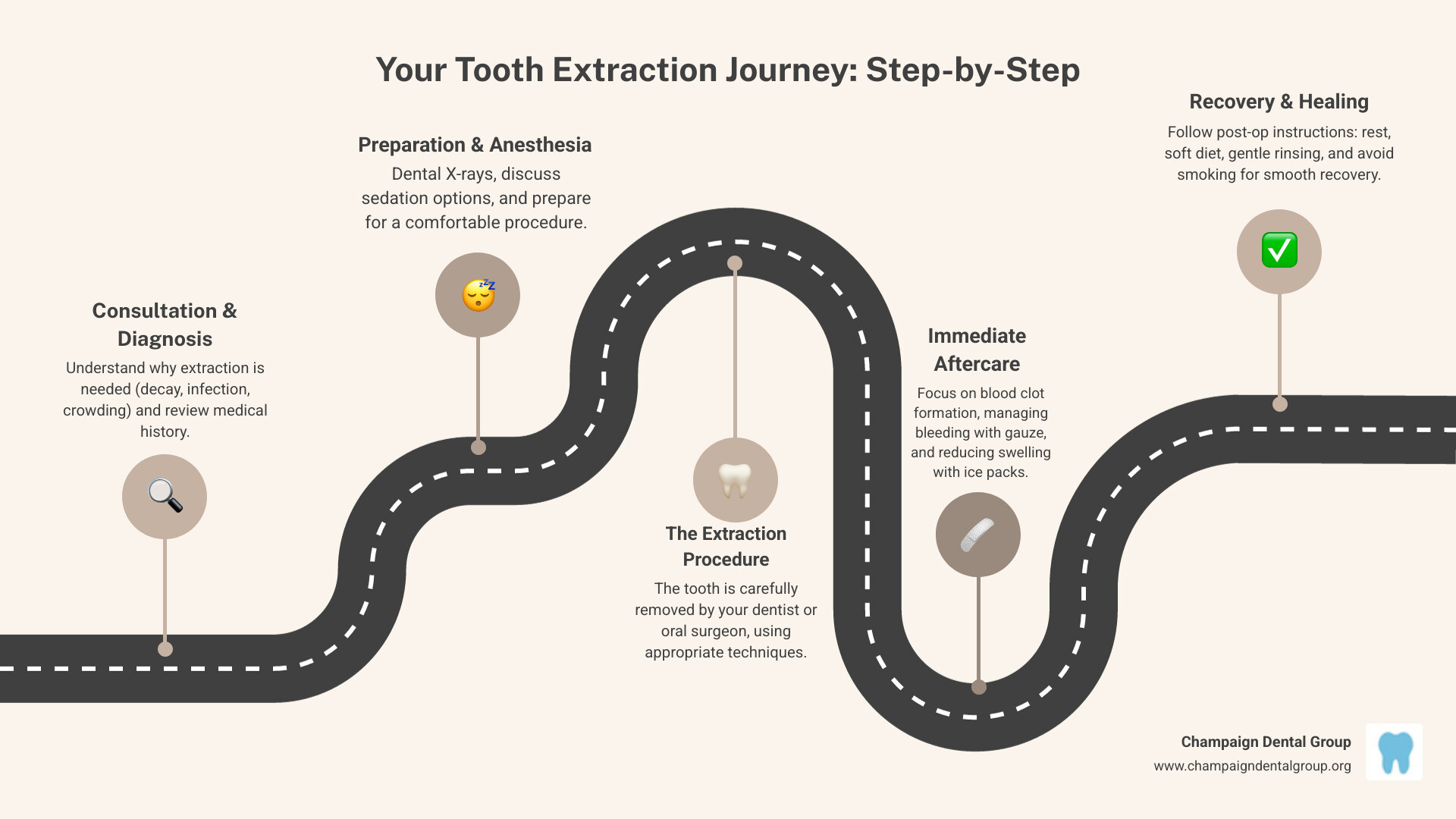An Essential Guide to Tooth Extractions: What to Expect

Understanding Tooth Extractions: What You Need to Know
Tooth extractions involve the complete removal of a tooth from its socket in the jawbone. While saving your natural teeth is always our priority, sometimes an extraction is the best option for your overall oral health.
What is a Tooth Extraction and Why Might it Be Necessary?
A tooth extraction is a common dental procedure to remove a tooth that cannot be saved by other treatments like fillings or root canals.
Key reasons for an extraction include:
- Severe Decay: When a cavity is too large to repair. This is the most common reason for extractions, accounting for up to two-thirds of cases (excluding wisdom teeth).
- Infection: If an infection or abscess has spread and cannot be treated with a root canal.
- Crowding: To create space for orthodontic treatment or to allow other teeth to erupt properly.
- Damage: A tooth that is broken or fractured beyond repair.
- Advanced Gum Disease: When periodontal disease loosens teeth and damages the supporting bone.
- Impacted Teeth: Often wisdom teeth that lack space to erupt, causing pain or damaging adjacent teeth.
- Medical Needs: Removing compromised teeth before treatments like chemotherapy or organ transplants to prevent serious complications.
Modern dentistry makes Tooth Extractions safe and comfortable. At Champaign Dental Group, our team provides state-of-the-art care with a compassionate touch, ensuring you feel at ease.

Tooth Extractions vocab explained:
Sometimes, we can save a tooth that might otherwise need extraction. For instance, if a tooth has a deep infection but is structurally sound, a Root Canal Treatment can often save it. We always explore all viable alternatives with you before recommending an extraction.
Who Performs a Tooth Extraction?
Tooth extractions are commonly performed by general dentists, like our experienced team at Champaign Dental Group. We handle most routine extractions in our office, using advanced technology for precision and comfort.
For more complex cases, such as deeply impacted wisdom teeth, we may refer you to a specialist. Oral surgeons specialize in surgical procedures of the mouth and jaw, while periodontists (gum specialists) may perform extractions related to severe gum disease. We work closely with trusted specialists, like those providing Oral Surgeon Services, to ensure seamless, high-quality care.
The Procedure: Preparation and What Happens During Your Appointment
Preparing for a tooth extraction can feel daunting, but our team at Champaign Dental Group is here to guide you. Being well-prepared helps ensure a smooth procedure and a better recovery.

Your pre-procedure consultation involves a thorough review of your situation. We take detailed dental X-rays to see your tooth's roots, surrounding bone, and nearby structures, creating a roadmap for a safe procedure.
We will also review your medical history. It's vital to disclose all medications, including prescriptions, over-the-counter drugs, and supplements. Some, like blood thinners, may need adjustment to ensure your safety. Certain health conditions, like heart issues or a compromised immune system, may require pre-procedure antibiotics to prevent infection. Your safety is our top priority.
How to Prepare for Your Extraction
We'll provide specific instructions custom to you. General guidelines include:
- Arrange Transportation: If you're receiving IV sedation or general anesthesia, you must have a trusted friend or family member drive you home.
- Follow Fasting Instructions: For sedation, you'll likely need to avoid food and drink for six to eight hours beforehand. We'll provide exact timing.
- Dress Comfortably: Wear loose-fitting clothing, especially a short-sleeved shirt if you're having IV anesthesia.
- Avoid Smoking: Do not smoke before your procedure, as it can complicate healing.
We understand dental anxiety is real. Our compassionate team offers various Sedation Dentistry options, from nitrous oxide to oral conscious sedation, to help you feel calm. Please discuss any fears with us; we are experts at making patients feel at ease.
What Are the Different Types of Tooth Extractions?
We perform two main types of tooth extractions: simple and surgical. The method depends on the tooth's condition and accessibility.
| Feature | Simple Extraction | Surgical Extraction |
|---|---|---|
| Visibility | Tooth is visible above the gum line | Tooth is broken below the gum line or impacted |
| Anesthesia | Typically local anesthetic | Local anesthetic, IV sedation, or general anesthesia |
| Procedure | Loosened with an elevator, removed with forceps | Incision in gum, possibly bone removal, tooth sectioning |
| Complexity | Considered routine dental procedure | More complex, may require specialist |
| Healing Time | Generally quicker (up to 2 weeks for soreness) | Can be longer (3-4 weeks for wisdom teeth) |
Simple extractions are for teeth visible in the mouth. After numbing the area, we use an elevator to loosen the tooth and forceps to remove it. The process is often quick, taking 20 to 30 minutes.
Surgical extractions are for teeth that aren't easily accessible, such as those broken at the gum line or impacted wisdom teeth. These may require sedation for your comfort. The procedure might involve a small incision in the gum, removal of some bone, or sectioning the tooth into smaller pieces for a gentler removal. Our skilled team uses advanced techniques to ensure the process is as smooth as possible.
Anesthesia and Comfort
Your comfort is paramount. We offer several anesthesia options to ensure a pain-free procedure.
- Local Anesthetic: This is standard for simple extractions, numbing the tooth and surrounding tissues completely.
- Sedation Options: For anxious patients or surgical extractions, we offer nitrous oxide (laughing gas), oral conscious sedation, or IV sedation for deeper relaxation.
- General Anesthesia: For complex cases, this may be used in a hospital setting, rendering you completely unconscious.
A common question is, "Will it hurt?" With proper anesthesia, you should not feel pain during the extraction. You may feel some pressure, which is normal. You might also hear some sounds as the tooth is loosened, which is also a normal part of the process. Our team at Champaign Dental Group is committed to making your experience as comfortable and stress-free as possible.
Recovery and Essential Aftercare Instructions
With your tooth extraction complete, the focus shifts to healing. Following our aftercare instructions is your roadmap to a comfortable, complication-free recovery.

Recovery Timeline
Healing varies, but here's a general timeline after a tooth extraction:
- First 24 hours: This is when the crucial blood clot forms. It acts as a natural bandage, protecting the exposed bone and nerves.
- First few days: Some swelling and mild discomfort are normal. Swelling usually peaks around 48 hours before subsiding.
- One to two weeks: The socket should be well on its way to healing. Any stitches may dissolve or be removed at a follow-up visit.
- Several weeks/months: The underlying bone will take longer to heal completely. This is important if you are considering a dental implant.
Immediately After Your Extraction
The first few hours are critical for proper healing:
- Bite on Gauze: Bite firmly on the provided gauze for 30-45 minutes to help a blood clot form. If bleeding continues, use a fresh piece for another 30 minutes. For more details, see our guide on How to Stop Bleeding After Tooth Extraction.
- Protect the Blood Clot: This clot is essential for healing and preventing a painful condition called dry socket. Avoid disturbing it.
- Use Ice Packs: Apply an ice pack to your cheek for 10-20 minutes at a time during the first 24-48 hours to reduce swelling.
- Take Pain Medication: Take medication as directed. Staying ahead of the pain will make your recovery more comfortable.
Post-Extraction Care for a Smooth Recovery
Here are the key do's and don'ts for a quick recovery:
- DO rest for the first 24 hours and avoid strenuous activity for 2-3 days.
- DO sleep with your head liftd on extra pillows to minimize swelling.
- DO eat soft foods like soup, yogurt, and smoothies. Avoid chewing near the extraction site.
- DO rinse gently with salt water (1/2 tsp salt in 8 oz warm water) after 24 hours, especially after meals.
DO brush and floss your other teeth gently, avoiding the extraction site for at least three days.
DON'T use straws or create any suction in your mouth for at least 72 hours.
- DON'T smoke or use tobacco for at least 72 hours, as it slows healing and increases complication risks.
- DON'T eat hot, crunchy, or sticky foods for at least a week.
- DON'T touch the extraction site with your tongue or fingers.
- DON'T drink alcohol for at least 24 hours, as it can interfere with healing and medications.
For specific advice on wisdom teeth, see our Wisdom Teeth Removal Care Tips. Our team at Champaign Dental Group is always just a phone call away if you have any questions during your recovery.
Potential Risks and When to Call Your Dentist
While tooth extractions are routine and highly successful, understanding potential complications helps you know when to seek help. Following our aftercare instructions is the best way to ensure a smooth recovery.

At Champaign Dental Group, we take every precaution to minimize risks. Our experienced team has provided compassionate care since 1997, and we're always here for you. For urgent issues, our Urgent Dental Care guide offers immediate advice.
What Are the Risks of Tooth Extractions?
- Dry Socket: This is the most common complication. This painful condition occurs if the protective blood clot is dislodged or fails to form, exposing the underlying bone and nerves. It typically starts 1-3 days post-procedure. The best prevention is following aftercare instructions, especially avoiding straws and smoking.
- Infection: Though rare with proper care, signs include fever, chills, or pus. Research on antibiotics to prevent complications following tooth extractions shows they can reduce infection risk by 66% after impacted wisdom tooth removal. We will advise if antibiotics are right for you.
- Prolonged Bleeding: Light oozing is normal, but heavy bleeding that continues after applying pressure requires our attention.
- Nerve Damage: A rare complication, particularly with lower wisdom teeth, that can cause temporary numbness in the lip, chin, or tongue. We use detailed X-rays to assess and minimize this risk.
- Sinus Issues: Extracting upper back teeth can create a tiny opening into the sinus cavity. Most heal on their own, but larger ones may need repair.
- Damage to Adjacent Teeth: A rare risk that our skilled dentists avoid with precise, gentle techniques.
Warning Signs to Watch For
Some discomfort and swelling are normal. However, call us immediately if you experience any of the following:
- Severe, worsening pain that isn't helped by medication (a sign of dry socket).
- Fever or chills (a temperature of 100.4°F or higher).
- Pus or a foul odor from the extraction site.
- Excessive bleeding that soaks gauze after 30 minutes of firm pressure.
- Swelling that worsens or lasts more than three days.
- Nausea or vomiting.
- Persistent numbness or adverse reactions to medication.
Trust your instincts. If something doesn't feel right, please contact us. The compassionate team at Champaign Dental Group would rather you call with a question than worry at home.
Frequently Asked Questions about Tooth Extractions
We know you have questions about tooth extractions. Here are clear, straightforward answers to some of the most common concerns we hear from our patients.
How much does a tooth extraction typically cost?
The cost of a tooth extraction depends on whether it's a simple or surgical procedure, the type of anesthesia used, and the tooth's complexity. Most dental insurance plans cover a significant portion of medically necessary extractions. Our team at Champaign Dental Group will work with your provider to maximize your benefits.
For patients without insurance, we believe quality care should be accessible. Our Smile Protection Plan offers an affordable alternative for essential treatments. We also partner with CareCredit Financing to provide flexible payment plans.
We always provide a transparent cost estimate before your procedure, so you can get the care you need without financial stress.
Is a tooth extraction painful?
No, the procedure itself is not painful. We use highly effective local anesthetics to completely numb the area. You may feel pressure, but not pain. For patients with dental anxiety, our Sedation Dentistry services, including nitrous oxide or oral sedation, ensure you remain comfortable and relaxed.
After the anesthetic wears off, some mild discomfort and swelling are normal. This is easily managed with recommended or prescribed pain medication. Our compassionate team at Champaign Dental Group excels at helping even the most anxious patients feel at ease.
Do I need to replace an extracted tooth?
Yes, in most cases, replacing an extracted tooth is vital for your long-term oral health. A missing tooth can cause remaining teeth to shift, affect your bite and chewing, and lead to jawbone loss. This can create new problems, including strain on your jaw and difficulty cleaning your teeth.
Fortunately, we offer excellent replacement options:
- Dental Implants: The best choice for preserving jawbone and providing a natural look and feel.
- Crowns and Bridges: A durable solution that uses adjacent teeth as anchors.
- Dentures: An affordable way to restore function and appearance when multiple teeth are missing.
Our team will discuss all your options to help you choose the best solution for your health, lifestyle, and budget. We are committed to protecting your oral health for years to come.
Your Partner for Compassionate Dental Care
We hope this guide has provided confidence and knowledge about tooth extractions. While no one looks forward to this procedure, modern dentistry has made it far more comfortable and predictable than you might imagine.
The key takeaways are simple: professional care is essential to avoid more complex issues, and modern techniques make extractions safe and comfortable. Following aftercare protocols is crucial for promoting quick healing.
At Champaign Dental Group, we have proudly served the Urbana and Champaign County communities since 1997. We've built our reputation on an unwavering commitment to high-quality, compassionate patient care. We understand that dental procedures can be stressful, which is why our entire team is dedicated to making you feel heard, supported, and genuinely cared for.
Our state-of-the-art technology ensures your tooth extraction is performed with the highest precision and safety. What truly sets us apart is combining advanced care with the personal touch of treating every patient like family. We take the time to explain everything, answer all your questions, and ensure you feel completely comfortable throughout your treatment.
Whether you need immediate attention for a problematic tooth or want to discuss your long-term oral health, we are here to help. Your smile is important to us, and we're committed to helping you maintain it for a lifetime.
Request an Appointment with us today and find why so many families in our community trust Champaign Dental Group with their smiles.
.jpg)